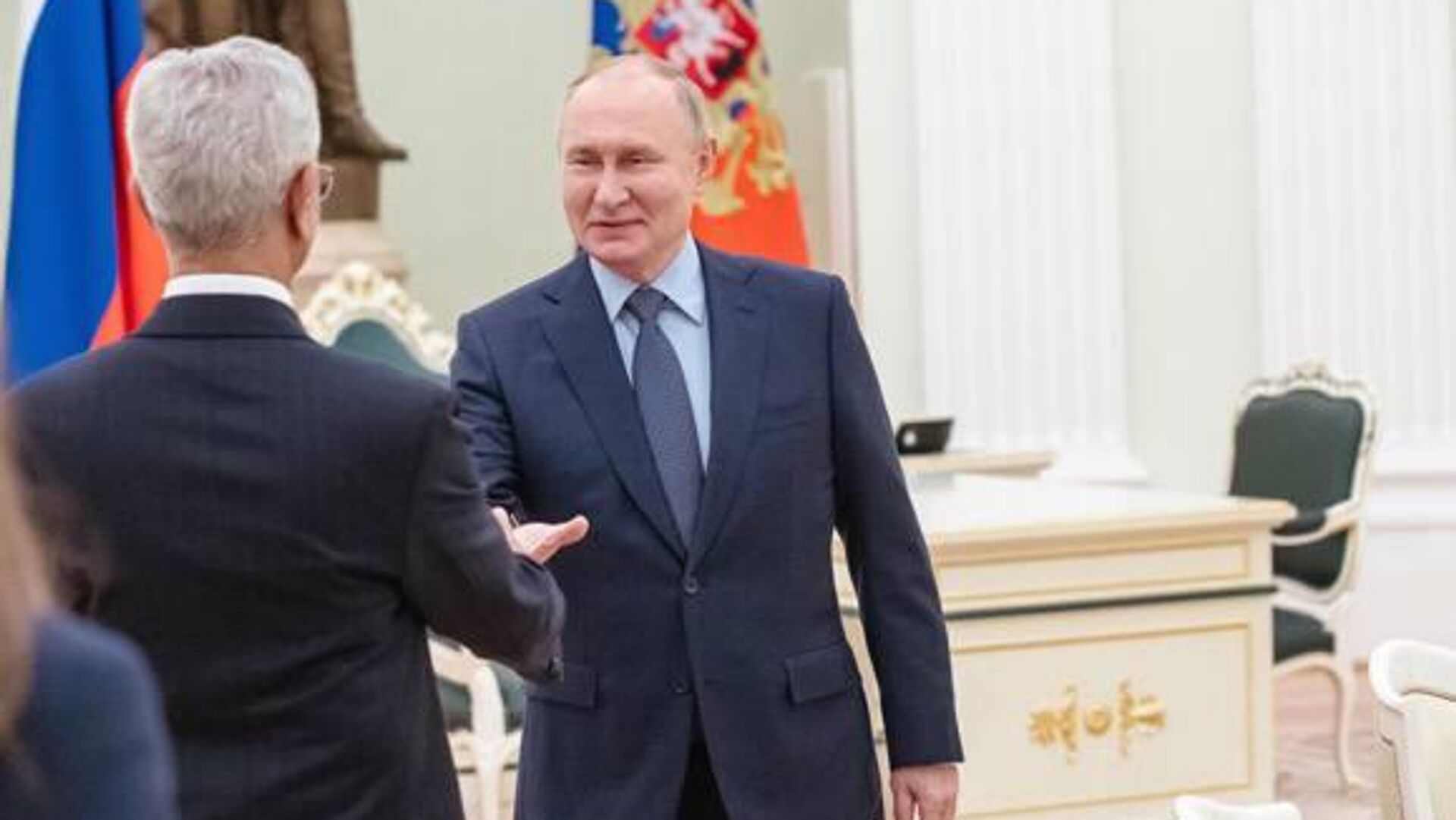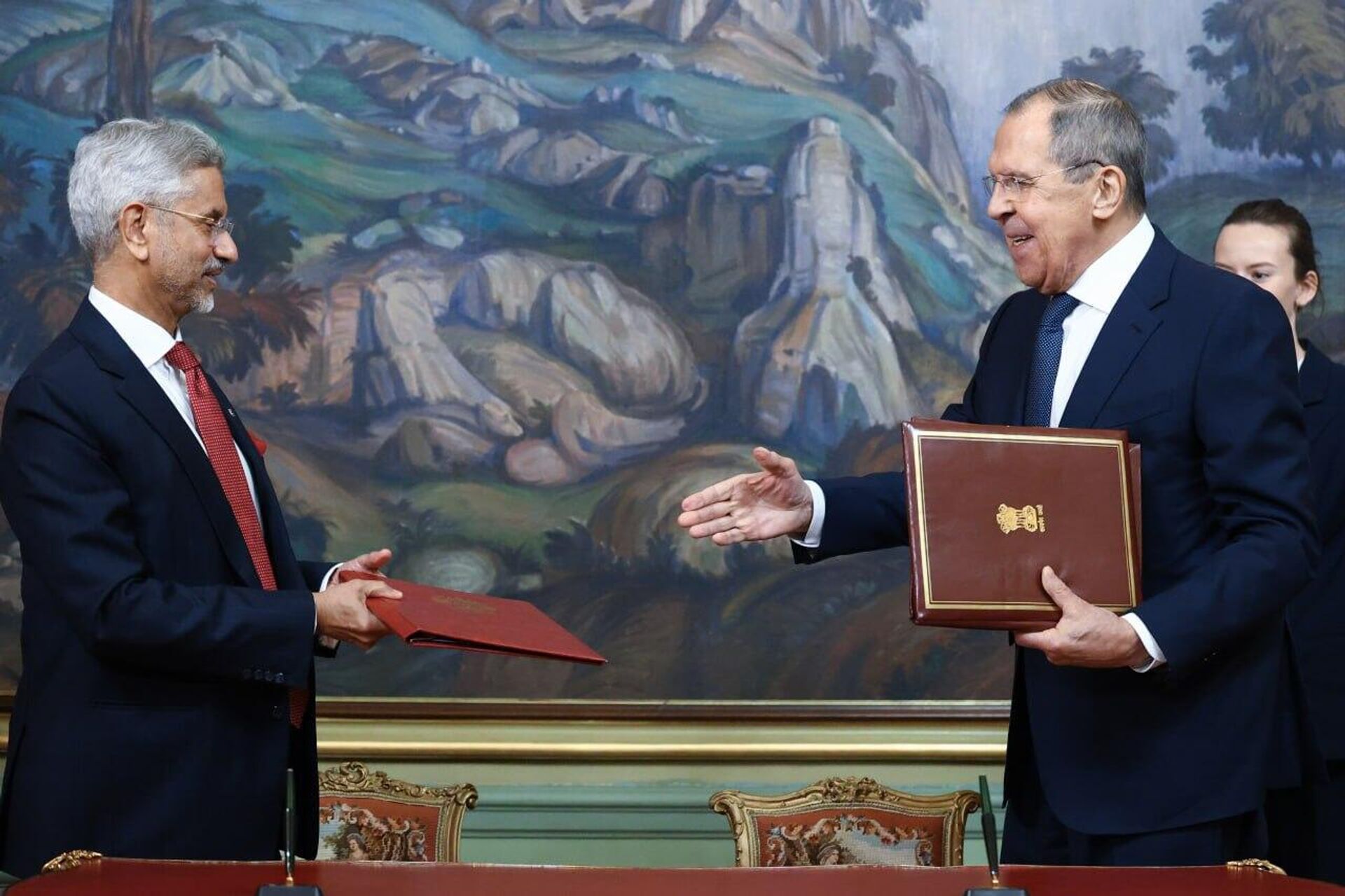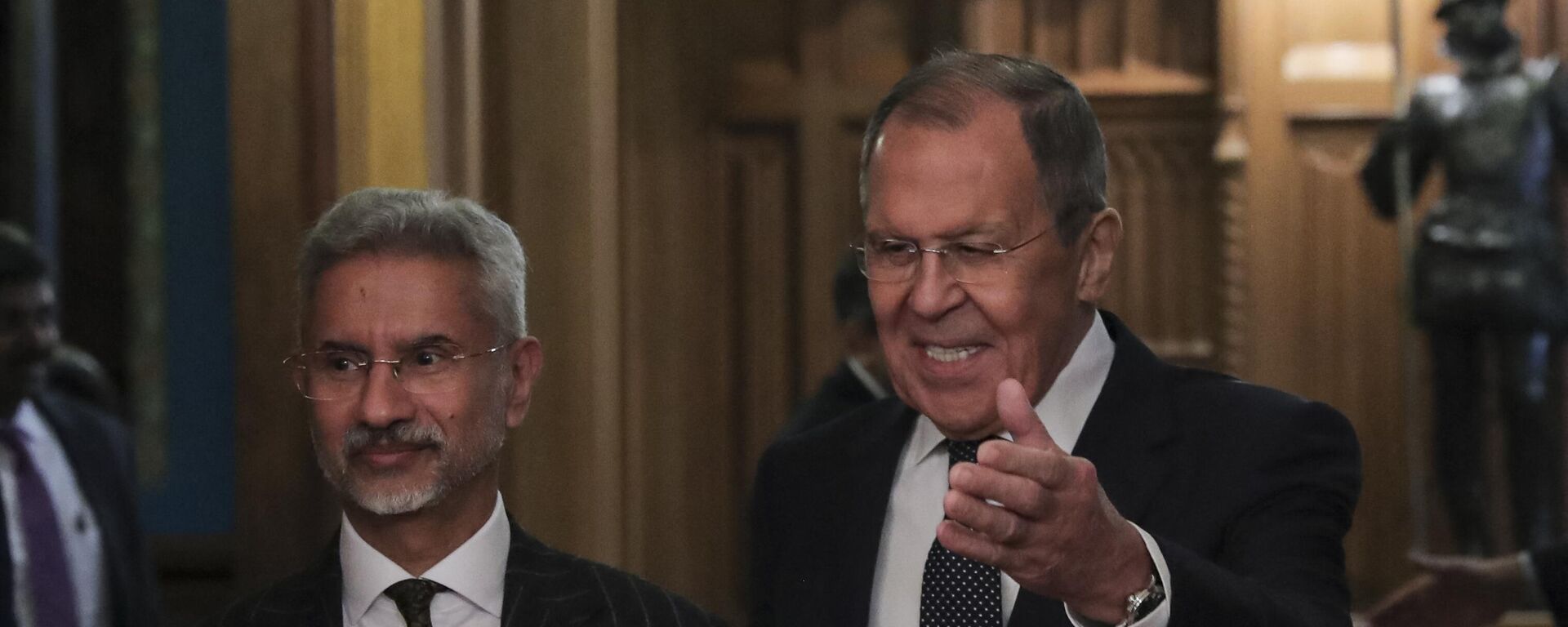https://sputniknews.in/20231230/how-has-2023-transformed-india-russia-relations-for-the-better-6010557.html
How 2023 Transformed India-Russia Relations for the Better
How 2023 Transformed India-Russia Relations for the Better
Sputnik India
The top diplomats from India and Russia met seven times in bilateral and multilateral formats this year. Indian NSA Ajit Doval and FM Jaishankar even met President Putin during their visits to Moscow.
2023-12-30T11:00+0530
2023-12-30T11:00+0530
2023-12-30T11:00+0530
indo-russian relations
india
russia
european union (eu)
moscow
s. jaishankar
sergey lavrov
vladimir putin
special military operation
military cooperation
https://cdn1.img.sputniknews.in/img/07e7/0c/1c/5994425_0:93:579:419_1920x0_80_0_0_8369d5fdd7bd308a5724523cb84f34c6.jpg
Indian Foreign Minister S Jaishankar’s five-day official visit to Moscow and St. Petersburg towards the fag-end of the year marks the highest point of India’s and Russia’s time-tested ‘special and privileged strategic partnership’ in 2023. Against the backdrop of the growing geopolitical polarisation in the wake of Ukraine conflict, Jaishankar once again reaffirmed that India-Russia relations remained the “only constant” in world politics. Addressing a joint press briefing with Jaishankar after their wide-ranging talks, Russian Foreign Minister Sergey Lavrov stressed on the fact the expanding cooperation in military-technical cooperation as well as energy was “strategic” in nature. How has 2023 Reinforced the role of Trade as a Major Pillar of India-Russia TiesRussian President Vladimir Putin told Jaishankar during a meeting at the Kremlin that bilateral trade volume had been soaring for two years in a row.Putin said that there was growing cooperation in not only crude and coal, but also in high-tech areas. As far as Russian crude exports to India are concerned, they have boomed since the Ukraine conflict.In fact, Russia’s share of energy imports in Indian basket used to account for less than 2 percent before 2022. Currently, Russia ranks as the biggest supplier of crude to India, meeting around 40 percent of India’s overall oil requirements.Jaishankar lauded the growing trade volume between India and Russia, noting that it had already crossed a historic high of $50 billion. He said that the "potential" of India-Russia trade was only beginning to show now.Lavrov said this week that both the nations had accelerated efforts to sign a pact to protect mutual investments and were in the process to draft an agreement for an India-Eurasian Economic Union (EAEU) Free Trade Agreement (FTA). The top Russian diplomat also said that both the countries would soon “launch” the International North-South Transport Corridor (INSTC), the Chennai-Vladivostok route and jointly work towards developing the Northern Sea Route (NSR), thus bolstering the framework for carrying out trade between the nations.Russia-India Energy Ties to Continue After Ukraine Conflict, Expert Says The geopolitical expert noted that the booming oil trade had given an “unexpected boost” to economies ties between the two nations.“It would also serve as an impetus for a broader ecosystem of several economic actors and interlinked industries that can flourish along with the growing energy trade,” the expert added. The Future of India-Russia Defence Cooperation Traditionally, Russia has been the primary supplier of arms and spares to India. According to Stockholm International Peace and Research Institute (SIPRI), India imported around 45 percent of its weapons from Russia between 2018 and 2022. Former Deputy chief of Indian Army, Lieutenant General Ravi Sawhney, told Sputnik India that around 60 percent of weapons and spares used in all the three Indian services were of Russian-origin.However, as noted by Lavrov, the focus of India-Russia military-industrial cooperation is increasingly shifting towards helping New Delhi develop its own defence manufacturing base under Prime Minister Narendra Modi’s ‘Make in India’ policy. Lavrov has said that both the nations are holding discussions for “joint production of modern weapons”. The two nations have already inked a pact “Military Technical Cooperation" for 2021-2031.With a bilateral annual summit between Modi and Putin on the cards in 2024, the "special" relationship is expected to only develop further in 2024.
https://sputniknews.in/20231226/how-us-tried-but-failed-to-disrupt-india-russia-relations-5969702.html
india
russia
moscow
Sputnik India
feedback.hindi@sputniknews.com
+74956456601
MIA „Rossiya Segodnya“
2023
Dhairya Maheshwari
https://cdn1.img.sputniknews.in/img/07e6/0c/13/138962_0:0:641:640_100x100_80_0_0_2cb44360dbcdf6d84bf4b299cd045917.jpg
Dhairya Maheshwari
https://cdn1.img.sputniknews.in/img/07e6/0c/13/138962_0:0:641:640_100x100_80_0_0_2cb44360dbcdf6d84bf4b299cd045917.jpg
News
en_IN
Sputnik India
feedback.hindi@sputniknews.com
+74956456601
MIA „Rossiya Segodnya“
Sputnik India
feedback.hindi@sputniknews.com
+74956456601
MIA „Rossiya Segodnya“
Dhairya Maheshwari
https://cdn1.img.sputniknews.in/img/07e6/0c/13/138962_0:0:641:640_100x100_80_0_0_2cb44360dbcdf6d84bf4b299cd045917.jpg
india russia relations, jaishankar russia visit, jaishankar lavrov meeting, jaishankar putin meeting, india russia trade, russian crude exports to india, russian oil exports to india, western sanctions, instc, northern sea route, chennai vladivostok maritime corridor, chennai vladivostok route, russian fertilizer exports, russian coal exports
india russia relations, jaishankar russia visit, jaishankar lavrov meeting, jaishankar putin meeting, india russia trade, russian crude exports to india, russian oil exports to india, western sanctions, instc, northern sea route, chennai vladivostok maritime corridor, chennai vladivostok route, russian fertilizer exports, russian coal exports
How 2023 Transformed India-Russia Relations for the Better
The top diplomats from India and Russia met seven times in bilateral and multilateral formats this year. Indian NSA Ajit Doval and FM Jaishankar even met President Putin during their visits to Moscow.
Indian Foreign Minister S Jaishankar’s five-day official visit to Moscow and St. Petersburg towards the fag-end of the year marks the highest point of India’s and Russia’s time-tested ‘special and privileged strategic partnership’ in 2023.
During his official engagements and public interactions this week, Jaishankar drove home the message that bilateral relations would continue to grow deeper based on “strategic convergence, geopolitical interests” and due to their mutually beneficial nature.
Against the backdrop of the growing geopolitical polarisation in the wake of Ukraine conflict, Jaishankar once again
reaffirmed that India-Russia relations remained the “only constant” in world politics.
Addressing a joint press briefing with Jaishankar after their wide-ranging talks, Russian Foreign Minister Sergey Lavrov stressed on the fact the expanding cooperation in military-technical cooperation as well as energy was “strategic” in nature.
How has 2023 Reinforced the role of Trade as a Major Pillar of India-Russia Ties
If 2022 marked the beginning of the process of trade becoming a major pillar of India-Russia ties, the year 2023 only reinforced the trend.
Russian President Vladimir Putin told Jaishankar during a meeting at the Kremlin that
bilateral trade volume had been soaring for two years in a row.
Putin said that there was growing cooperation in not only crude and coal, but also in high-tech areas. As far as Russian crude exports to India are concerned, they have boomed since the Ukraine conflict.
In fact, Russia’s share of energy imports in Indian basket used to account for less than 2 percent before 2022. Currently, Russia ranks as the biggest supplier of crude to India, meeting around 40 percent of India’s overall oil requirements.
Noting that India-Russia trade has already crossed a historic high of $50 billion this year, Jaishankar informed the Russian President that the “trade potential” was beginning to show only now.
Jaishankar lauded the growing trade volume between India and Russia, noting that it had already crossed a historic high of $50 billion. He said that the "potential" of India-Russia trade was only beginning to show now.
Lavrov said this week that both the nations had accelerated efforts to sign a pact to protect mutual investments and were in the process to draft an agreement for an India-Eurasian Economic Union (EAEU) Free Trade Agreement (FTA).
The top Russian diplomat also said that both the countries
would soon “launch” the International North-South Transport Corridor (INSTC), the
Chennai-Vladivostok route and jointly work towards developing the
Northern Sea Route (NSR), thus bolstering the framework for carrying out trade between the nations.
Russia-India Energy Ties to Continue After Ukraine Conflict, Expert Says
Zorawar Daulet Singh, the founder of the Northcap University and an adjunct fellow at Institute of Chinese Studies (ICS), told Sputnik India that Russia’s growing focus on Asia-Pacific was a reflection of the “geoeconomic transformation in the world economy”.
“The reorientation of Russian energy supply chains to Greater Eurasia is a trend that will continue for several decades even after the Ukraine conflict subsides because India and China have emerged as major markets for Russia with a high degree of geopolitical trust,” Singh stated.
The geopolitical expert noted that the
booming oil trade had given an “unexpected boost” to economies ties between the two nations.
“The opportunity henceforth is to solidify the supply chain by pursuing joint projects and ventures — shipping, logistics, finance, insurance, the north-south international corridor, downstream refineries, fertilisers, etc,” he reckoned.
Singh explained that a strategy geared towards developing trade supply chains would insulate the bilateral trade relationship from “western sanctions and coercion” by creating and supporting a “soft and hard infrastructure for Russia-India geoeconomic linkages”.
“It would also serve as an impetus for a broader ecosystem of several economic actors and interlinked industries that can flourish along with the growing energy trade,” the expert added.
The Future of India-Russia Defence Cooperation
Traditionally, Russia has been the primary supplier of arms and spares to India.
According to Stockholm International Peace and Research Institute (SIPRI), India imported around 45 percent of its weapons from Russia between 2018 and 2022.
Former Deputy chief of Indian Army, Lieutenant General Ravi Sawhney, told Sputnik India that around 60 percent of weapons and spares used in all the three Indian services were of Russian-origin.
“Moscow will continue to be an important defence partner for us,” Sawhney said, adding that Russia has taken care to ensure that India meets its defence needs despite the turbulences caused by Ukraine conflict.
However, as noted by Lavrov, the
focus of India-Russia military-industrial cooperation is increasingly shifting towards helping New Delhi develop its own defence manufacturing base under
Prime Minister Narendra Modi’s ‘Make in India’ policy.
Lavrov has said that both the nations are holding discussions for “joint production of modern weapons”. The two nations have already inked a pact “Military Technical Cooperation" for 2021-2031.
With a bilateral annual summit between Modi and Putin on the cards in 2024, the "special" relationship is expected to only develop further in 2024.




